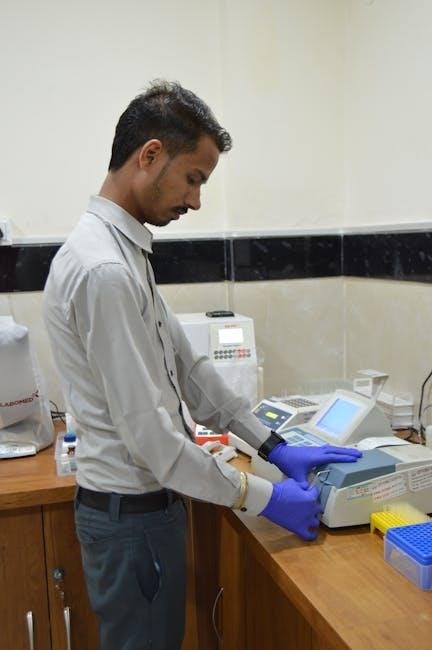A pharmacy technician study guide is an essential resource for understanding roles, responsibilities, and exam preparation. It provides structured learning materials in PDF format, ensuring accessibility and convenience for aspiring professionals.
Overview of Pharmacy Technician Roles and Responsibilities
Pharmacy technicians assist pharmacists with dispensing medications, processing prescriptions, and managing inventory. Their roles include receiving and stocking supplies, preparing medication labels, and ensuring accurate dosages. They also handle administrative tasks like patient records and insurance claims. Additionally, technicians must comply with legal regulations, maintain patient confidentiality, and provide basic patient support. Understanding these responsibilities is crucial for effective job performance and certification preparation, as detailed in pharmacy technician study guides.
Importance of Study Guides for Certification and Professional Development
Pharmacy technician study guides are vital for certification preparation and professional growth. They provide comprehensive resources to master key concepts, such as pharmacology, laws, and patient safety. These guides organize study materials efficiently, ensuring technicians are well-prepared for exams like the Certified Pharmacy Technician (CPhT) certification. Additionally, they offer practice questions and tips to improve test-taking skills. Beyond certification, study guides serve as valuable references for ongoing professional development, helping technicians stay updated on industry standards and best practices. They are essential tools for both new learners and experienced professionals seeking to enhance their expertise and deliver high-quality patient care.
Key Features of a Comprehensive Pharmacy Technician Study Guide
A comprehensive pharmacy technician study guide typically includes practice questions, exam-style tests, and detailed explanations to help prepare for certification exams. It covers core topics such as pharmacology, pharmacy laws, and patient safety, ensuring a thorough understanding of essential skills. Many guides also provide test-taking strategies and tips to improve confidence and performance. Additionally, they often include downloadable PDF formats for easy access and portability. These resources are designed to align with certification requirements, offering a structured approach to learning and professional development.

Core Topics Covered in Pharmacy Technician Study Guides
Pharmacy technician study guides cover essential topics like pharmacology, pharmacy laws, prescription processing, inventory management, and patient safety, providing a foundation for certification and professional competence.
Pharmacy Operations and Workflow Management
Pharmacy operations and workflow management are critical components of a technician’s role, focusing on efficient task organization and execution. Study guides detail workflows, including prescription intake, processing, and dispensing, ensuring seamless patient care. They emphasize communication strategies, inventory systems, and quality control measures to maintain accuracy and safety. Techniques for minimizing errors and optimizing productivity are also covered, along with tools for managing priorities and stress during peak periods. Understanding these operational aspects is vital for technicians to contribute effectively to team success and deliver high-quality patient services while adhering to professional standards and protocols.
Pharmacy Laws and Regulations
Pharmacy laws and regulations govern the ethical and legal practices of pharmacy technicians, ensuring patient safety and compliance. Study guides detail federal and state-specific laws, including controlled substance handling, HIPAA compliance, and prescription requirements. They cover OSHA standards for workplace safety and proper record-keeping protocols. Understanding these regulations is crucial for technicians to avoid legal issues and maintain professional integrity. The guides also provide updates on evolving laws and industry standards, offering practical scenarios to reinforce compliance. This knowledge ensures technicians operate within legal frameworks while prioritizing patient confidentiality and care.
Pharmacology and Drug Classification
Pharmacology and drug classification are critical for pharmacy technicians to understand drug mechanisms, effects, and therapeutic uses. Study guides detail drug classes, such as antibiotics, analgesics, and anticoagulants, explaining their indications and potential interactions. They also cover adverse effects, contraindications, and dosage forms. This knowledge helps technicians ensure safe and effective medication distribution. Many guides include charts and diagrams to simplify complex drug information, making it easier to retain. Additionally, they provide exam-style questions to test comprehension of pharmacology concepts, ensuring readiness for certification exams and real-world patient care scenarios.
Prescription Processing and Filling
Prescription processing and filling are fundamental tasks for pharmacy technicians, requiring attention to detail and adherence to protocols. Study guides outline the step-by-step process, from receiving and verifying prescriptions to preparing and dispensing medications. They emphasize accurate interpretation of prescriptions, proper labeling, and ensuring patient safety. Guides also cover handling controlled substances, managing refills, and addressing insurance issues. Techniques for efficient workflow and minimizing errors are highlighted, along with compliance with legal requirements. This section equips technicians with the practical skills needed to process prescriptions accurately and efficiently, ensuring patient safety and satisfaction.
Inventory Management and Control
Inventory management and control are critical for maintaining efficient pharmacy operations. Study guides detail methods for tracking stock levels, minimizing waste, and ensuring medication availability. They cover techniques for ABC analysis, automated systems, and cycle counting to optimize inventory. Emphasis is placed on accurate ordering, storage, and monitoring of expiration dates. Proper handling of controlled substances and compliance with regulatory requirements are also addressed. Effective inventory control reduces costs, prevents stockouts, and enhances patient care. These strategies enable pharmacy technicians to manage supplies effectively, ensuring seamless workflow and adherence to legal standards.
Patient Safety and Communication Skills
Patient safety and effective communication are vital for pharmacy technicians. Study guides emphasize protocols to prevent medication errors, such as accurate labeling and allergy checks. They also cover communication strategies to ensure clear interactions with patients, pharmacists, and healthcare teams. Understanding patient needs, providing clear instructions, and addressing concerns are highlighted. These skills are essential for building trust and ensuring safe medication use. Study guides often include scenarios and tips to enhance these abilities, making them indispensable for professional development and improving patient outcomes.

Certification and Exam Preparation
Certification and exam preparation are crucial for pharmacy technicians. Study guides offer practice questions, test-taking strategies, and comprehensive reviews to ensure readiness for the CPhT exam.
Certified Pharmacy Technician (CPhT) Exam Overview
The Certified Pharmacy Technician (CPhT) exam is a critical step toward professional certification. Administered by the Pharmacy Technician Certification Board (PTCB), it assesses knowledge and skills in areas like pharmacy operations, pharmacology, and patient safety. The exam consists of 90 multiple-choice questions and must be completed within 1 hour and 50 minutes. Eligibility requires a high school diploma or equivalent and completion of a training program or relevant work experience. Study guides play a vital role in preparation, offering practice questions and insights into the exam format. Passing the CPhT exam demonstrates competence and enhances career opportunities in the field.
Exam-Style Practice Questions and Answers
Exam-style practice questions and answers are a cornerstone of effective preparation for the CPhT exam. These resources simulate real exam conditions, helping candidates familiarize themselves with the format and content. Many study guides include hundreds of questions covering key topics such as pharmacy operations, pharmacology, and patient safety. Detailed explanations for each answer enhance understanding and retention. Practice questions also help identify weak areas, allowing focused study. With accessible PDF formats, these tools are indispensable for self-assessment and confidence-building, ensuring readiness for the certification exam and future professional challenges.

Test-Taking Strategies and Tips
Mastering test-taking strategies is crucial for success in the CPhT exam. Effective time management, understanding question formats, and skimming techniques can significantly improve performance. Many study guides offer tips on how to approach multiple-choice questions, such as eliminating incorrect answers first. Practicing with timed exercises helps build confidence and reduces anxiety. Additionally, strategies like prioritizing high-probability questions and reviewing answers can maximize scores. These tips, often included in PDF study guides, empower candidates to navigate the exam efficiently and achieve their certification goals with confidence and precision.
PTCB (Pharmacy Technician Certification Board) Requirements
The PTCB (Pharmacy Technician Certification Board) requires candidates to meet specific eligibility criteria before taking the CPhT exam. These include completing a PTCB-recognized training program or gaining relevant work experience under a licensed pharmacist. Applicants must also pass a criminal background check and adhere to PTCB’s policies. The exam itself covers critical areas like pharmacy operations, pharmacology, and federal regulations. Study guides play a vital role in preparing for these requirements, offering structured content and practice questions aligned with PTCB standards. Meeting these requirements ensures candidates are well-prepared for the certification process and their future roles in pharmacy practice.

Where to Find Pharmacy Technician Study Guide PDFs
Pharmacy technician study guide PDFs are available through websites like Pharmacy Technician Guide, PTCB, and other online platforms, offering both free and premium resources for exam preparation.
Free Resources Available Online
Free pharmacy technician study guide PDFs are widely available online, offering valuable resources for exam preparation. Websites like Pharmacy Technician Guide and PTCB provide downloadable materials, including practice questions, conversion calculators, and study tips. These resources are designed to help candidates understand key concepts, such as pharmacology, laws, and patient safety. Additionally, platforms like Pharmacy Regulation offer detailed guides on pharmacy operations and workflow management. These free resources are an excellent starting point for aspiring technicians, allowing them to access essential information without cost, ensuring they are well-prepared for certification exams and professional development.
Premium Study Guides and Their Benefits
Premium pharmacy technician study guides offer comprehensive, organized content tailored for certification success. They include advanced practice questions, detailed explanations, and interactive tools like conversion calculators and video tutorials. These guides often cover topics such as pharmacology, laws, and patient safety in depth, ensuring a thorough understanding. Many premium resources are reviewed by experts, enhancing credibility and reliability. They also provide structured learning paths, progress tracking, and focused study schedules. While free resources are helpful, premium guides deliver superior quality and convenience, making them a worthwhile investment for serious candidates aiming to excel in their exams and professional roles.
Recommended Websites for Downloading PDF Guides
Several websites offer reliable pharmacy technician study guides in PDF format. The Pharmacy Technician Guide website provides free and premium resources, including practice exams and detailed study materials. The PTCB (Pharmacy Technician Certification Board) website offers official study guides and practice tests. Additionally, the National Healthcareer Association (NHA) and Rx Tech Exam websites are trusted sources for certification preparation. These platforms ensure access to updated, comprehensive materials, helping candidates prepare effectively for their exams and gain a deeper understanding of pharmacy technician roles and responsibilities.

Using Study Guides Effectively
Maximize your learning by creating a structured study schedule and incorporating active learning techniques like self-quizzing and summarizing key concepts. Utilize additional resources, such as practice exams and online forums, to reinforce understanding and stay updated on industry developments.
Creating a Study Schedule
Developing a structured study schedule is crucial for effective learning. Start by setting clear, achievable goals for each study session. Allocate specific time slots for different topics, ensuring a balanced approach. Incorporate regular breaks to maintain focus and avoid burnout. Prioritize challenging areas and dedicate extra time to mastering them. Use a planner or digital calendar to stay organized and track progress. Regularly review and adjust your schedule to accommodate new material or areas needing more attention. Consistency is key to retaining knowledge and staying on track with your pharmacy technician certification goals.
Active Learning Techniques for Better Retention
Engaging in active learning enhances memory retention and understanding. Techniques include self-quizzing, summarizing key concepts, and teaching others. Use flashcards to review pharmacology and medical terminology. Practice with real-world scenarios to apply knowledge. Discuss challenging topics with peers to gain new insights. Incorporate hands-on activities, like labeling diagrams or calculating dosages, to reinforce practical skills. Regularly test yourself with practice exams to identify weak areas. These methods ensure dynamic interaction with study materials, making learning more effective and enjoyable for pharmacy technicians.
Utilizing Additional Resources for Supplemental Learning
Supplement your studies with online forums, video tutorials, and simulation tools. Join pharmacy technician forums like Reddit or specialized groups to discuss challenges and share tips. Watch instructional videos on YouTube or medical education platforms for visual learning. Use simulation software to practice tasks like prescription processing or inventory management. Explore professional organizations for additional guides or webinars. These resources enhance your understanding and application of pharmacy technician skills, ensuring a well-rounded education.

Skills and Knowledge for Pharmacy Technicians
Pharmacy technicians need strong math skills, medical terminology knowledge, and the ability to handle medications and equipment. Study guides help master these essential competencies effectively.
Math and Measurement Skills
Math and measurement skills are critical for pharmacy technicians to ensure accurate medication preparation and administration. These skills include converting units, calculating dosages, and understanding fractions and decimals. Pharmacy technician study guides emphasize mastering conversions, such as inches to centimeters or millimeters, which are essential for precise measurements. For example, converting 3 3/8 inches to a decimal (3.375 inches) or understanding metric conversions is vital. These guides often provide practice problems and real-world scenarios to help technicians apply mathematical concepts effectively, ensuring patient safety and preventing medication errors. Strong math skills are foundational for competent pharmacy practice and certification success.
Understanding Medical Terminology
Understanding medical terminology is vital for pharmacy technicians to effectively communicate with healthcare professionals and accurately interpret prescriptions. Pharmacy technician study guides emphasize the importance of mastering root words, prefixes, and suffixes to decode medical terms. This knowledge helps in identifying drug classes, understanding disease states, and recognizing anatomical terms. For instance, terms like “hypertension” (relating to blood pressure) or “antibiotic” (infection-fighting drugs) are commonly encountered. Study guides often include exercises and examples to reinforce learning, ensuring technicians can apply terminology in real-world scenarios. Proficiency in medical terminology enhances patient safety and ensures precise communication in pharmacy practice.
Handling Medications and Equipment
Pharmacy technicians must master the proper handling of medications and equipment to ensure safety and efficiency. Study guides detail techniques for accurately counting pills, using automated dispensers, and operating tools like label printers. Proper handling minimizes errors and contamination, ensuring patient safety. Techniques include verifying medication labels, storing drugs appropriately, and disposal methods. Equipment maintenance, such as calibrating scales or cleaning machines, is also covered. These skills are critical for maintaining workflow and compliance in pharmacy settings, emphasizing precision and adherence to protocols for controlled substances and hazardous materials.

Legal and Regulatory Considerations
Pharmacy technicians must adhere to state-specific laws, controlled substance regulations, and HIPAA compliance to ensure patient confidentiality and legal practice. Understanding these regulations is crucial for professional integrity.
State-Specific Laws and Regulations
State-specific laws and regulations dictate the scope of practice for pharmacy technicians, varying significantly across regions. These laws outline certification requirements, permissible tasks, and supervisory needs. Some states require registration or licensure, while others allow technicians to work under a pharmacist without certification. Understanding these regulations is crucial for compliance and professional practice. For instance, certain states permit technicians to compound medications, while others restrict them to clerical duties. Staying informed about local laws ensures technicians operate within legal boundaries, maintaining patient safety and organizational integrity. These regulations are detailed in pharmacy technician study guides to guide professionals effectively.
Controlled Substances and Handling Requirements

Controlled substances require strict adherence to handling, storage, and documentation protocols. Pharmacy technicians must follow DEA regulations, ensuring proper labeling, secure storage, and accurate record-keeping. Training on controlled substances is essential for compliance and patient safety. Proper disposal methods are also critical to prevent misuse. These guidelines are thoroughly covered in study guides to ensure technicians understand their legal and ethical responsibilities. Adhering to these requirements helps prevent diversion and maintains the integrity of the pharmacy operation. Regular updates in study materials reflect changing laws and best practices in controlled substance management.
HIPAA Compliance and Patient Confidentiality
HIPAA compliance is critical for pharmacy technicians to protect patient health information (PHI). Study guides emphasize the importance of maintaining confidentiality and securely handling PHI. Technicians must understand legal consequences of violations. Proper training ensures adherence to privacy standards, minimizing risks of unauthorized disclosures. Key aspects include secure storage of records, limited access to PHI, and proper disposal methods. Study materials highlight best practices for safeguarding patient data, ensuring compliance with federal regulations. This knowledge is vital for ethical practice and legal adherence in pharmacy settings, ensuring patient trust and confidentiality are upheld.

Additional Resources for Pharmacy Technicians
Explore practice exams, online forums, and continuing education programs to enhance your skills. These resources complement study guides, offering hands-on experience and updated industry knowledge.
Practice Exams and Assessment Tools
Practice exams and assessment tools are invaluable for pharmacy technicians to evaluate their knowledge and readiness for certification. These resources mimic real exam formats, helping candidates familiarize themselves with question types and timing. Many study guides include exam-style questions with detailed answers, enabling self-assessment and identification of weak areas. Additionally, conversion tools for measurements, such as inches to centimeters, are often provided to enhance math skills critical for pharmacy tasks. Utilizing these tools ensures a comprehensive understanding of both theoretical and practical aspects, boosting confidence and performance in professional exams;
Online Communities and Forums
Online communities and forums provide pharmacy technicians with platforms to connect, share resources, and gain insights from experienced professionals. These spaces foster collaboration, offering access to study materials, exam tips, and real-world advice. Many forums, such as dedicated Facebook groups or Reddit communities, allow technicians to discuss challenges and best practices. Additionally, these platforms often share links to free or premium study guides, practice exams, and conversion tools for measurements like inches to centimeters. Engaging with these communities enhances learning and professional growth, making them invaluable for both new and seasoned technicians.
Continuous Education and Professional Development
Continuous education is crucial for pharmacy technicians to stay updated on industry advancements and maintain certification. Study guides, especially in PDF format, offer flexible learning opportunities, enabling technicians to refresh their knowledge at their own pace. These resources often include updates on new medications, laws, and technologies. Professional development programs, workshops, and online courses further complement these guides, ensuring technicians are well-prepared for evolving roles. Lifelong learning not only enhances skills but also supports career growth, making it essential for professionals in this dynamic field to regularly engage in educational activities and utilize available study materials effectively.
Mastering pharmacy technician study guides is key to success, ensuring knowledge retention and exam readiness. These resources empower professionals for lifelong learning and career advancement in healthcare.
Final Tips for Success
To excel as a pharmacy technician, prioritize consistent study habits and active learning. Utilize practice exams to assess readiness and identify weak areas. Focus on mastering pharmacology, legal requirements, and patient communication. Stay organized with detailed notes and flashcards to reinforce key concepts. Leverage online communities for support and shared resources. Regularly review updates in pharmacy laws and medication advancements. Apply theoretical knowledge to real-world scenarios for better retention. Finally, embrace lifelong learning to stay competitive and adaptable in this dynamic field. These strategies will ensure confidence and competence in your career.
The Importance of Lifelong Learning in Pharmacy
Lifelong learning is crucial for pharmacy technicians to stay updated on emerging medications, technologies, and regulations. The field evolves rapidly, requiring continuous education to maintain competency. Study guides, such as those in PDF formats, serve as valuable tools for ongoing professional development. They provide accessible resources to review best practices, understand new drug therapies, and adapt to regulatory changes. Embracing lifelong learning ensures pharmacy technicians deliver high-quality patient care and remain competitive in their careers. By committing to continuous education, professionals can enhance their skills and contribute to advancing the pharmacy profession.
